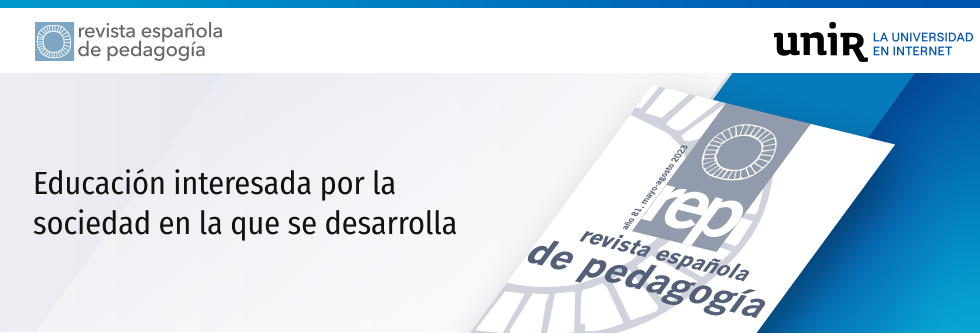Abstract
Few pedagogical research journals around the world have managed to continue being a success for 75 years. Therefore, it was reasonable to celebrate this anniversary and reflect on the paths followed to get to this point. Firstly, the need to combat the convenience of acquiescing to what is socially dominant and so awaken a desire to improve the objective quality of educational work are considered. In addition, the importance of encouraging the imagination in order to discover how to meet the challenges of the present moment and the need to protect the Journal’s reputation are noted, something as complex and keenly debated as it is necessary.
The piece concludes by providing the main data about the Journal’s past and present as well as making a proposal for how to develop it in the future, and to this end it underlines the importance of encouraging creativity in the search for pedagogical answers to the main problems facing education in our time.
Cómo citar este artículo: Ibáñez-Martín, J. A. (2018). Las revistas de investigación como humus de la ciencia, donde crece el saber | Research journals as the topsoil where scientific knowledge grows. Revista Española de Pedagogía, 76 (271), 541-554. doi: 10.22550/REP-3-2018-08
Referencias | References
Aristóteles (1970). Ética a Nicómaco. Madrid: Instituto de Estudios Políticos.
Blanquer, J. M. (2018). El profesor, en el mundo del mañana, será aún más importante que hoy. El país, 13 de abril. Retrieved from https://elpais.com/internacional/2018/04/13/actualidad/1523631029_267641.html (Consulted on 24-07-2018).
Buchmann, M. C. (1987). Teaching Knowledge: the lights that teachers live by. Oxford Review of Education, 13 (2), 151-164. doi: 10.1080/0305498870130203
Buffon, M. (1753). Discours sur le style. Texte de l’édition de l’abbé J. Pierre Librairie Ch. Poussielgue, Paris, 1896.
Burbules, N. C. (2014). Philosophical Reflections on Editing. Educational Theory, 64 (4), 317- 331. doi: 10.1111/edth.12069
Cain, T., & Allan, D. (2017). The invisible impact of educational research. Oxford Review of Education, 43 (6), 718-732. doi: 10.1080/03054985.2017.1316252
Drago-Severson, E. (2007). Helping teachers learn. Teachers College Record, 109 (1), 70-125.
Drago-Severson, E. (2012). New Opportunities for Principal Leadership: Shaping School Climates for Enhanced Teacher Development. Teachers College Record, 114 (3), 1-44.
Green, T. H. (1981). The activities of teaching. USA: McGraw-Hill.
Gusdorf, G. (1969). Para qué los profesores. Madrid: EDICUSA.
Feuer, M. S., Towne, L., & Shavelson, R. J. (2008). Scientific Culture and Educational Research. Educational Researcher, 31 (8). doi: 10.3102/0013189X031008004
Mackintosh, N. J. (Ed.) (1995). Cyril Burt: Fraud or Framed? Oxford: Oxford University Press.
Merton, R. K. (1968). The Matthew Effect in Science. Science, 159 (3810), 56-63. doi: 10.1126/science.159.3810.56
Ordorika, I. (2018). Las trampas de las publicaciones académicas | The academic publishing trap. Revista Española de Pedagogía, 76 (271), 463-480. doi: 10.22550/REP-3-2018-04.
Shulman, L. S. (2005). Signature pedagogies in the professions. Daedalus, 134 (3), 52-59. doi: 10.1162/0011526054622015
Steiner, G., & Ladjali, C. Elogio de la transmisión. Madrid: Siruela.
Citación recomendada | Recommended citation
Ibáñez-Martín, J. A.
(2018)
.
Research journals as the topsoil where scientific knowledge grows.
Revista Española de Pedagogía, 76(271).
https://www.revistadepedagogia.org/rep/vol76/iss271/13
Licencia Creative Commons | Creative Commons License
Esta obra está bajo una licencia internacional Creative Commons Atribución-NoComercial 4.0.
This work is licensed under a Creative Commons Attribution-NonCommercial 4.0 International License
Palabras clave | Keywords
75thanniversaryoftherevistaespañoladepedagogía, dataabouttherevistaespañoladepedagogía, dedicationtotheprincipalproblemsofeducationalwork, imagination, qualityineducationalresearch







